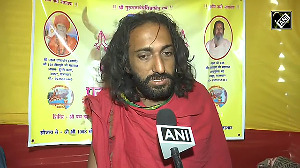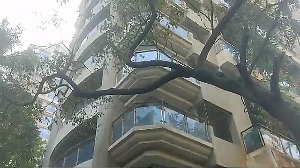As Prabhakaran was leaving his house, Rajiv Gandhi called his son Rahul and asked him to fetch his (Gandhi's) bulletproof jacket.
He put the jacket on Prabhakaran's back and remarked with his usual charming smile: "Take care of yourself."
A fascinating excerpt from M R Narayan Swamy's must read new book, The Rout Of Prabhakaran.
- Part 1: The World's First Suicide Bomber

Prabhakaran's flight movements were kept top secret. The Indians feared that rogue elements of the Sri Lankan air force could shoot down Prabhakaran's plane if they knew his presence. Two Indian air force helicopters flew into Jaffna with Colombo's permission to fetch (Hardeep) Puri, Prabhakaran, his wife and children, his aides and bodyguards.
Moments before the choppers took off, a sombre-looking Shankar -- a senior LTTE member -- came over to Puri and whispered: "You are taking away our national treasure."
Puri responded: "I give you my word of honour that Prabhakaran shall be dropped back at the very same place, whatever the outcome of his discussions in Delhi."
It was the first time Prabhakaran was travelling over the sea dividing Sri Lanka and India that he had so many times crossed by boat since the 1970s.
In less than an hour the helicopters landed at Trichy town in Tamil Nadu. Everyone shifted to a sturdy Soviet-built Indian Air Force Anatov transporter for a quick journey to Madras.
Journalists mobbed Prabhakaran at the airport. For the media, the invitation to the LTTE chief was tantamount to an official recognition of his group by India.
For years Prabhakaran had been demanding that New Delhi should accord the Tamil Tigers the same status as given to the Palestine Liberation Organization and the African National Congress.
After LTTE cadres drove off his wife and children, Prabhakaran left the airport along with Balasingham to meet MGR. There was euphoria in the air. Balasingham told a journalist -- as he had told a senior official of India's Intelligence Bureau, the country's domestic intelligence agency, earlier -- that the LTTE was ready for a settlement to the dragging conflict.
Prabhakaran was in a jovial mood at the Indian Airlines lounge of the Madras airport where Puri and he went for lunch. Puri ordered chicken curry and rice, thinking the guerrilla leader would follow suit.
Prabhakaran said he preferred chapattis, the flat north Indian wheat bread. "I don't eat rice because it affects the trigger finger," he chuckled.
As the aircraft took off from Madras to New Delhi, Prabhakaran's mood changed. The man suddenly looked gloomy. "I don't know what I am getting into," he told Puri. "The transformation from gun to politics is not easy."
The Indian diplomat engaged in small talk with Prabhakaran, but largely left the latter immersed in thoughts until the plane touched down at an air force base near the busy international airport in New Delhi.

Prabhakaran lands in Delhi
Things started going wrong the moment Prabhakaran checked into the government-run Hotel Ashok, located close to the city's elegant and tree-lined diplomatic neighbourhood.
When J N Dixit, the pipe-smoking Indian envoy to Sri Lanka, called on Prabhakaran at his suite, the latter complained he had not been shown a copy of the agreement India and Sri Lanka were preparing to sign. He started reiterating his goal of Eelam.
The LTTE chief shifted uncomfortably when Dixit suggested that LTTE should sign an accord with New Delhi after Prabhakaran's talks with the Indian prime minister.
By the next morning, it was clear to Prabhakaran that he was not the exclusive one from the Tamil side to be invited to New Delhi. India's decision to airlift him from Jaffna could after all not be construed as a diplomatic recognition of the LTTE.
In the nearby Hotel Samrat were delegations of the TULF and five Tamil militant groups. These included, besides the pro-LTTE EROS, three outfits Prabhakaran loathed: TELO, PLOT and EPRLF.
India wanted to show the world that all Tamil groups, including the Tigers, backed its efforts to bring about a negotiated end to the ethnic conflict in Sri Lanka.
That was indeed the Indian plan. Diplomats of the two countries had worked out an agreement that would be signed by Prime Minister Rajiv Gandhi and President Jayewardene, who was facing stiff opposition to the idea from Sri Lanka's conservative but powerful Buddhist clergy and Sinhalese hardliners -- both within his party and the Opposition who dubbed the impending accord a sell-out to the Tamils.
Prabhakaran disagrees with the agreement
When Indian officials handed over a copy of the India-Sri Lanka accord to Prabhakaran on the morning of July 25, Puri first read out the various clauses, which were translated to Tamil by Balasingham. This took about 75 minutes, after which Prabhakaran sought time to discuss the agreement with his colleagues.
The Indian officials went back into his room around noon with an air of expectancy, only to be told categorically that the agreement was completely unacceptable to Prabhakaran.
The Indians were taken aback. They had surmised that the deal was all dressed up and the LTTE boss was at last amenable to the idea of a negotiated settlement.
Prabhakaran raised a string of objections. Sri Lanka had not recognised Tamils as a distinct nationality; the agreement seemed to treat Tamils at par with insignificant minorities; it did not reserve the north-eastern region to the Tamils; the long-standing demand for a merger of the northern and eastern provinces was left to the sweet will of the Sri Lankan president; making it obligatory for the LTTE and other Tamil groups to put down their weapons within 72 hours of the pact being signed was unrealistic and unfair since there was no guarantee what the future held for the Tamils.
Puri tried his best to convince Prabhakaran, taking up each objection and arguing out each clause. Puri excelled in the nuances of diplomacy and statecraft but Prabhakaran was not interested.
After some time, a visibly miffed Prabhakaran declared he could not accept the India-Sri Lanka agreement and would not give up the demand for Eelam.

'He is obstinate, but he is a key player'
Prabhakaran now wanted Tamil Nadu Chief Minister MGR, whom he regarded as his godfather, to join the talks. Rajiv Gandhi agreed. The chief minister flew to New Delhi along with his minister S Ramachandran.
During discussions the LTTE chief put forth one demand: He wanted Sri Lankan security forces withdrawn from the Vadamarachchi region, which they had seized about two months previously.
An ardent fighter turned astute negotiator, Prabhakaran was trying to win diplomatically what he could not militarily.
Gandhi pressed Indian officials to make Prabhakaran relent. To the Indian prime minister, the agreement with Jayewardene would be a feather in his cap if it brought about an end to the bloodshed in Sri Lanka.
Rajiv Gandhi knew that Prabhakaran's acceptance was crucial to the pact's success. "He is obstinate, but he is a key player," Gandhi told an aide. "If he accepts the accord, he will become the chief minister of northeastern Sri Lanka. He must then move on."
When Rajiv Gandhi came to know what Prabhakaran was insisting on, he asked Dixit to exert diplomatic pressure to ensure the withdrawal of the Sri Lankan military from the Vadamarachchi region.

'You have deceived India four times'
Sri Lankan National Security Minister Lalith Athulathmudali, the architect of the military action that brought LTTE to its knees, was furious and refused to accept the demand.
Dixit stormed into Jayewardene's office and warned that Gandhi would call off his trip to Colombo if the troops were not pulled back. Jayawardene quickly overruled Athulathmudali, leaving the minister red-faced. For years this made Athulathmudali staunchly anti-India.
Rajiv Gandhi was to travel to Colombo on July 29 to sign the agreement, but the Tiger leader stuck to his objections. Hectic efforts got underway again to change his mind.
The Indian foreign secretary and the chief of the Intelligence Bureau called on Prabhakaran. MGR also tried persuasion. There were heated discussions between LTTE and Indian officials. The fact that some Indian officials had no great respect for the LTTE's violent methods did not help matters.
There were other irritants too. Prabhakaran and his delegation were barred from meeting journalists although no such restriction was placed on other Tamil groups. LTTE members got the feeling that they were under duress to accept the accord.
Yogi said as much when he spoke over the phone to Adele, Balasingham's wife. Posted outside Prabhakaran's hotel suite were elite Indian commandos, armed to the teeth.
Dixit told Prabhakaran that the pact would be signed, even if he did not accept it. When Prabhakaran refused to budge, Dixit reportedly said accusingly: "You have deceived us (India) four times." Prabhakaran snapped: "That means we have saved our people four times."
The air was tense. LTTE thought Dixit and other Indian foreign policymakers were arrogant and had no idea of the complexities of the Sri Lankan imbroglio.

Prabhakaran: 'I feel like committing suicide'
When an Indian Tamil Member of Parliament, V Gopalasamy, sympathetic to the LTTE cause, telephoned Prabhakaran, the Tiger chief sounded dismal. "I feel like committing suicide," he lamented. "We have been betrayed by the Government of India, by Rajiv Gandhi. I have been stabbed in the back."
Prabhakaran looked very restless when EROS leaders Balakumar and Shankar Rajee called on him at his suite one evening. The LTTE chief paced up and down, occasionally staring out of the window, brooding. No one could read his thoughts.
Over snacks and tea, the India-Sri Lanka agreement dominated all discussions. The EROS representatives felt that those who did not accept the pact might not be allowed to leave the Indian capital. Arguments flew and tempers rose.
Even Balasingham, a veteran campaigner, appeared confused. "So what now?" he asked, looking askance at the LTTE chief. As if to break the ice, Prabhakaran simply said: "Look, let us eat now."
He picked up a menu card, asked each man his choice and told an aide to place the order. The food arrived, and everyone ate silently.
When the dinner was over, all eyes were on Prabhakaran to know if he had reached a decision. The LTTE chief was still torn between the pros and cons of the pact. He did not reply. He looked at the watch and said: "We still have time."
By then news of the impending agreement had leaked, and violent street protests erupted in the Sri Lankan capital Colombo.
The demonstrators, from the Sinhalese community, felt the accord gave too much to the Tamils whereas Prabhakaran's assessment was that all the aces were still with the Sri Lankan regime. India was caught in the crosscurrents.

Rajiv Gandhi meets Prabhakaran
Finally, late on the night of July 28, Prabhakaran agreed to meet Rajiv Gandhi at his office. Gandhi was all smiles as he warmly welcomed the guerrilla leader, who only two years ago had declined a meeting. A Tamil Nadu minister and Balasingham accompanied the LTTE boss.
Prabhakaran spoke softly and explained his fears. He said the Sri Lankan government could never be trusted. Gandhi was at his disarming best. He told Prabhakaran that he had the best interests of the Tamils in his heart and was trying to extract from Sri Lanka what he felt was a good deal for the community.
Prabhakaran brought up the monetary problems he would face if the LTTE called off its tax regime in Jaffna. Without hesitating, Gandhi agreed to make good the loss. The LTTE chief said his cadres also needed to be rehabilitated if they were to stop fighting. He needed money for that too. "I don't want the money to be given to me," he said earnestly. It was for the Tigers.
Gandhi told Prabhakaran that the LTTE's interests would be kept in mind. He pointed out that Jayewardene would have never agreed to put his signature on the pact but for the sacrifices by the Tamil Tigers. The Indian prime minister promised to give the LTTE a lion's share in the proposed administration in the northeastern province of Sri Lanka.
Prabhakaran insisted that the ERPLF -- a group he hated -- should have no say in the affairs of the Tamil region. Gandhi nodded. Prabhakaran decided, albeit belatedly, to give the India-Sri Lanka accord -- and by extension peace -- a chance.

Prabhakaran could not be trusted
Gandhi was very happy. He immediately ordered a celebratory dinner. As Prabhakaran was leaving his house, Gandhi called his son Rahul and asked him to fetch his (Gandhi's) bulletproof jacket. He put the jacket on Prabhakaran's back and remarked with his usual charming smile: "Take care of yourself."
As the Tiger chief prepared to fly back to his lair in Jaffna, the Indian leader left on a special flight to Colombo to make history. He would sign an agreement with the Sri Lankan president to end the turbulent Tamil separatist campaign.
Not everyone was upbeat though. Gandhi's foreign minister, P V Narasimha Rao, urged caution. Rao wanted the agreement to be signed by Sri Lanka and the Tigers, and not by New Delhi and Colombo.
Another Indian minister felt Prabhakaran could not be trusted. He had a suggestion: Why not hold Prabhakaran in India till the LTTE surrendered its weapons? Gandhi rejected the idea. "Prabhakaran has given his word," he said. "I trust him."
Excerpted from The Rout Of Prabhakaran by M R Narayan Swamy, with the kind permission of Konark Publishers Pvt. Ltd. The book is priced Rs 895.
ALSO READ
- India's Vietnam
- 'By the end of 1986, Prabhakaran was disillusioned with his Indian connection'
- 'If Prabhakaran thinks somebody has to go, he goes'
- The night Rajiv Gandhi died: An eyewitness account
Feature Presentation: Aslam Hunani/Rediff.com











 © 2025
© 2025